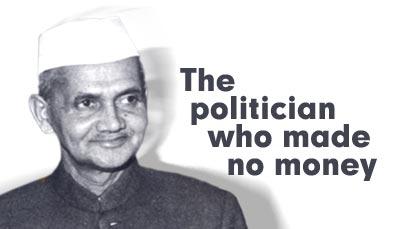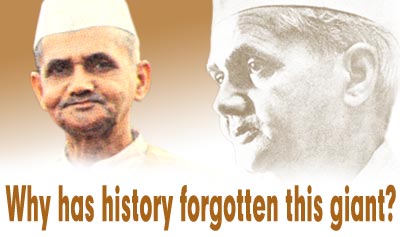LAL BAHADUR SHASTRI, the second prime minister of India, was a man of Highest Integrity. He was born on 2 October 1904 at Mughal sarai, near Banaras (Varanasi), Seven miles from Kashi in Uttar Pradesh. His father, a clerk in the Revenue office at Allahabad, died when he was hardly a year and a half old. His grandfather brought him up. Though his parents Sharada Prasad and Ramdulari Devi were Srivastavas, Shastri dropped his caste identity in his early years. Later he joined the Kashi Vidyapeeth and earned the epithet 'Shastri' by obtaining a degree on philosophy. In 1921, inspired by Bal Gangadhar Tilak and Gandhi; he cut short his studies to join India's freedom movement.
During the freedom movement he went to prision seven times and spent a total of nine years in the prision. The greatness of Lal Bahadur was that he maintained his self-respect 'even in prison. Once when Shastri was in jail, he received the news that his daughter fell ill. He requested the jailor to release him on parole to attend to his daughter. The jailor granted him 15 days parole. On reaching home, he learnt that his daughter had died. He performed the last rites of his daughter and told his family members that he was going back to the jail. When they reminded him that he was granted 15 days parole, he said, "That was to attend to my sick daughter. But when she is no more, there is no reason for me to take leave." After performing the obsequies he returned to his prison even before the expiry of the period.
A year passed his son was laid up with influenza this time Lal Bahadur was permitted unconditionally to go home for a week. But the fever did not come down in a week. Lal Bahadur got ready to go back to prison. The boy pleaded dumbly with his tearful eyes. In a weak voice he urged his father to stay. For a moment the father's mind was shaken. Tears rolled down from his eyes. But the next moment his decision was made. He bade good bye to all and left his home for prison. His son survived.
He Played a leading role in Indian freedom struggle; Became Parliamentary Secretary of Pandit Govind Vallabh Pant, the then chief minister of Uttar Pradesh; became the Minister of Police and Transport in Cabinet; appointed as the Railways and Transport Minister in the Central Cabinet; also held the portfolios of Transport & Communications, Commerce and Industry, and Home Ministry in the Central cabinet; As minister of Transport and communications after 1957 he started the shipbuilding yard at Visakhapatnam on the east coast in Andhra Pradesh. In 1952, Jawahar Lal Nehru appointed Lal Bahadur Shastri as the Railways and Transport Minister in the Central Cabinet. His contribution in providing more facilities to travelers in third class compartments cannot be forgotten. It was during his time that fans were provided in third class compartments. He reduced the vast disparity between the first class and third class in the Railways. He resigned from Railways in 1956, owning moral responsibility for a railway accident. Jawaharlal Nehru tried to persuade Shastriji but he refused to budge from his stand. By his action he set new standards of morality in public life.
He became the Home Minister in 1961, after the death of Govind Vallabh Pant. As home minister he strengthened the relationship between India and Nepal. He found out a solution to the language problem in Assam by introducing the use of English, Assamese and Bengal languages. He had rented a small house in Allahabad. Whenever he went to Allahabad, he used to stay in that house. After some time, the house owner had let it out to another family. When Shastri resigned as minister, he vacated the Government quarter and he did not have a place to live in. He did not have a house of his own, even when he was the Home Minister and people used to tease him the "Homeless Home Minister". In the 1962 India-China war Shastriji played a key role in maintaining internal security of the country.
After the death of Jawaharlal Nehru in 1964, Lal Bahadur Shastri was unanimously elected as the Prime Minister of India for a short period of 18 months. It was a difficult time and the country was facing huge challenges. There was food shortage in the country and on the security front Pakistan was creating problems. In 1965, Pakistan tried to take advantage of India's vulnerability and attacked India. Mild-mannered Lal Bahadur Shastri rose to the occasion and led the country ably. To enthuse soldiers and farmers he coined the slogan of "Jai Jawan, Jai Kisan". He reminded the nation that dependence on food imports undermined the country's self confidence and self respect and gave the nation a new slogan - Jai Jawan Jai Kisan'. It means Hail the soldier and Hail the farmer. He gave the slogan Jai Jawan Jai Kisan to enthuse the soldiers to defend India and simultaneously cheering farmers to do their best to increase the production of food grains to reduce dependence on import .It became a very popular slogan.
By "Jai Jawan Jai Kissan" Shastri had not only defined India's "Core-Competence" but also has seen the Indians as human being while "Bottom of Pyramids" look at then as consumers alone. When under the PL 480 programme, America was going to send inferior quality of wheat to India, he opposed it. He asked the nation to go hungry once a day than accept poor quality food from US. Before making this announcement he asked his wife not to cook evening meals. He himself followed what he recommended.
He solved many difficult problems with courage and wisdom. He appeared very modest but was a man of steel. An important quality of shastri was his Non controversial nature. He was a genius in striking balances, handling difficult situations, and achieving compromises. He had the ability to take quick decisions. At the same time When Pakistan attacked India in 1965 he hit back. He showed his mettle during the Indo-Pak war, which broke out in 1965. He made it clear to Pakistan and the world that India would not take it lying down, if Pakistan continued to encourage cross-border terrorism. He gave full freedom to the Armed Forces to retaliate and the military bases in Lahore and Sialkot were attacked.
During those tense days, in his address to the nation from Red Fort on Independence Day, he said: "Hathiyaron ka jawab hathiyaron se denge. (Force will be met with force.) Hamara desh rahega to hamara tiranga rahega. (Our flag will survive only if our country does)". Before the war many people laughed at him for his softness but not after the war. After the war, Shastri's name was all over. He came out as a tough hero. Pakistan lost the war and Shastriji's leadership was praised all over the world.
A day before his first press conference after becoming PM one journalist asked Shastriji what will be your message tomorrowHe said: "I'll tell them that during my tenure there will not be any increase in food price and as PM of India I would ask members of the Planning Commission to have one more column in their charts to show me how many jobs will be created after spending thousands of crores of rupees."
He tackled several problems like food shortage, unemployment and poverty. To overcome the acute food shortage, he initially imported food grains and distributed them throughout the country. Later, he drew long-term plans to make the country self-sufficient in food production. On January 10, 1966 Lal Bahadur Shastri died of with heart attack on night.
More than thirty years of dedicated service were behind Lal Bahadur Shastri. In the course of this period, he came to be known as a man of great integrity and competence. Humble, tolerant, with great inner strength and resoluteness, he was a man of the people who understood their language. He was also a man of vision who led the country towards progress. Lal Bahadur Shastri was deeply influenced by the political teachings of Mahatma Gandhi. "Hard work is equal to prayer," he once said, in accents profoundly reminiscent of his Master. In the direct tradition of Mahatma Gandhi, Lal Bahadur Shastri represented the best in Indian culture.
Lal Bahadur Shastrinever felt desire for money, a person who was down to earth, a real son of the soil, and stands for austerity, simplicity and consensus. His grounding was from the grassroots level. He was a practical man too. He strongly believed the laws of the land should be changed because the British formed them to rule over India. He did make an attempt by constituting the administrative reforms commission and made Morarji Desai its chairman. But after he died the idea was shelved.
Two qualities, which the leader of any nation must have, are devotion and efficiency. Lal Bahadur had both the qualities in a large measure. He would not swerve from his aim, come what may when the people of India Were fighting for freedom he brushed aside all thought of personal happiness and plunged into the freedom struggle. His daughters death, his son's illness, poverty - none of these made him swerve from his selection path. Even when he became a minister and later, the Prime Minister he was never attracted to a life of luxury and comfort.
The most favourite quote followed by the great the then prime minister is Guru Nanak's quotes in Gurmukhi.
When translated into English they mean -- Be simple and humble like the grass, because when a wild storm attacks, all the big trees get uprooted but the simple grass survives.Simple, but powerful.
Lal Bahadur Shastri was a simple man with great personality He is one and only Indian PM who was from humble family. He led his life with great simplicity and honesty and was a great source of inspiration for all the countrymen. Shastriji who represented a certain value system is more relevant today than before because a majority of us today have no value systems. He was a man concerned about the common man of India. Can these values return to this country? I don't think so.
Although shastri is not with us but his principal and simplicity always show the right way of life. We should follow such principals. Really he is my favorite great leader. His life was noble, loving and mainly in the highest sense! He is my mostfavoriteprime minister.
Let us all pray for a noble soul, a true hero, a leader of masses, and a valiant soldier the Laal of the nation. Jai Jawan Jai Kisan!
--
"Let noble thoughts come to me from all directions"
REGARDS
Miss.Shaija Vallikatri Bhaskaran
www.keralites.net         |
To subscribe send a mail to Keralites-subscribe@yahoogroups.com.
Send your posts to Keralites@yahoogroups.com.
Send your suggestions to Keralites-owner@yahoogroups.com.
To unsubscribe send a mail to Keralites-unsubscribe@yahoogroups.com.
Homepage: www.keralites.net






No comments:
Post a Comment